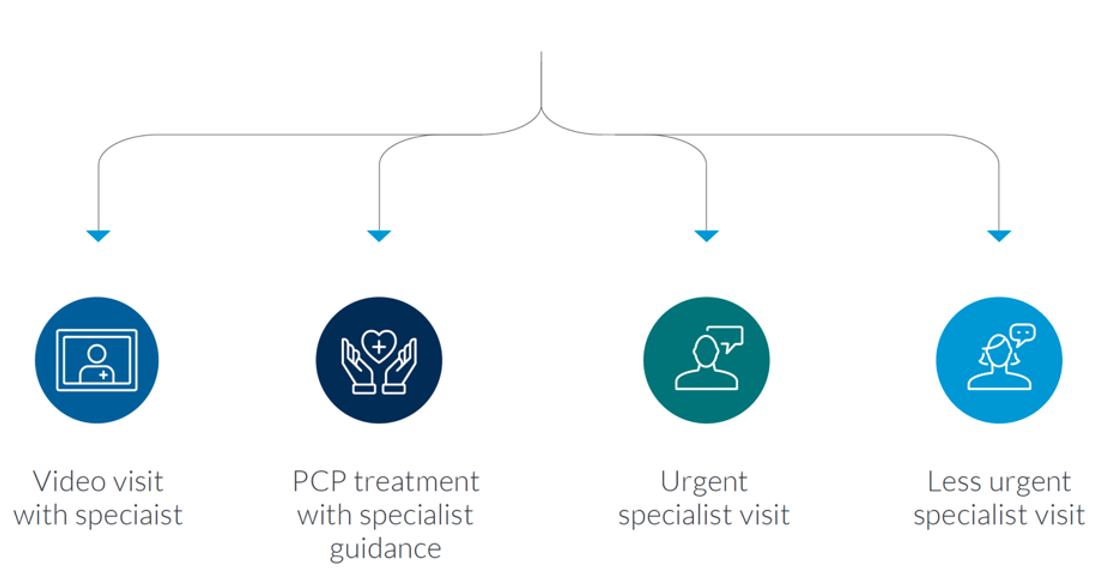Four Ways Physicians Can Use E-Consults to Triage Post-Pandemic Care Needs
By Peter Anderson
The pandemic caused millions of patients to delay getting healthcare. Now, there is a significant backlog of patients waiting to see their provider or undergo a procedure. Innovative solutions like telehealth triage can enable healthcare organizations to improve timely access to care within the most appropriate setting. As a telehealth triage tool, an e-consult platform directs patients to the most appropriate care setting as hospitals and clinics tackle their backlog of patients.
Post-pandemic patient backlog
Several pandemic-related factors have contributed to the nationwide patient backlog. Now, a second surge of patients flooding into medical settings following the COVID-19 slowdown poses increased stress to our healthcare system.
All types of patients have gone without care throughout the pandemic. Many patients have delayed or postponed care, either in an effort to avoid potential COVID-19 exposure or because their provider reduced available services. Healthy patients are forgoing proactive and ongoing care like checkups, annual exams, preventive screenings, and even vaccinations. Acutely and chronically ill patients haven’t received important routine tests, vital prescription drugs, or potentially life-saving medical or surgical interventions.
Below are some specific figures related to care provision throughout the pandemic:
- This past year, 39% of elderly adults canceled or delayed elective medical treatments, 32% canceled primary care, and 15% canceled an essential medical treatment (NORC at the University of Chicago, 2020).
- More than 55% of adults age 70 or older have experienced disruptions in their medical care (NORC at the University of Chicago, 2020).
- Since the coronavirus was declared a pandemic, total visits to hospitals nationwide have declined 32% to 60% compared to overall pre-coronavirus volumes (NORC at the University of Chicago, 2020).
- Appointments for preventive cervix, colon, and breast cancer screenings dropped between 86% and 94% when compared to average volumes during the three years prior to the confirmation of the first COVID-19 case in the U.S. (Epic Health Research Network, 2020)
In light of the high number of patients who need care, efficient triage has become even more essential. Technology that can direct patients to the right setting of care for quick and effective treatment can improve overall health outcomes and lower costs.
E-consults are an effective telehealth triage method
An e-consult platform is an asynchronous telehealth solution (also known as store-and-forward telehealth) that connects primary care providers via secure messaging to a network of on-demand specialists to guide patient care.
Payers and health systems can leverage innovative resources like e-consults to properly triage patients. Telehealth, which has enjoyed greatly increased adoption in the past year and a half, is proving to be an effective way to do this. Many health systems and clinics that rapidly implemented e-consults and other telehealth solutions plan to continue to expand their use of these technologies.
E-consults are a user-friendly telehealth triage tool that healthcare organizations can use to process referral queues and triage each patient into one of the following categories:
- Patients whose care can be managed remotely by specialists via video telehealth appointments
- Patients who can receive treatment from a primary care physician (PCP), or have additional workup and diagnostics completed, within the primary care setting following a consulting specialist’s treatment plan
- Patients who need face-to-face specialty appointments immediately
- Patients who need face-to-face specialty appointments less urgently
Four ways e-consult triage improves access to care and healthcare operations
- E-consults ensure the most appropriate use of PCP and specialist time. Specialty e-consults help to properly triage patients, allocating specialists’ time toward the right patients in the right venues. E-consults facilitate delegating care plans to PCPs when appropriate and saving face-to-face specialist appointments for patients who need them.
- E-consults remove patients from specialists’ queues. The average specialty referral yields 3.4 specialist visits. By leveraging e-consults, PCPs can use specialist-guided workups to remove patients from specialists’ queues and complete the workup and diagnostics within convenient, lower-cost primary care settings.
- E-consults can help prioritize patients for better management of specialty appointment queues. Many patients who need to see a specialist physician face to face do not require an urgent or immediate appointment. With the support of e-consults, specialists can identify these lower-priority, less urgent patients. Prioritization helps specialists manage their appointment queues more effectively. Telehealth triage that is supported by e-consults will reduce the backlog of specialty appointments so that all patients can be seen efficiently for the care they need.
- E-consults help ensure urgent referrals are processed as quickly as possible. After reviewing patient e-consult information submitted by PCPs, specialists can determine which patients need immediate face-to-face specialty appointments, validating urgent referrals to ensure they are processed right away.
E-consult telehealth triage is essential to healthcare systems today
E-consults support effective patient triage, improving access to care. As a telehealth triage resource, e-consults help PCPs practice at “the top of their license” and place patients within the most appropriate setting of care to improve timeliness and effectiveness of treatment.
As a downstream impact of more effective triage, patients who can be more appropriately treated within primary care, or another more effective setting, can receive care in that setting rather than waiting in a queue for a specialist appointment.
Peter Anderson is an AristaMD advisor and managing partner at HealthEco and formerly the founder and developer of the Carolinas Physicians Network, Inc. He went on to be chief strategy officer at Sutter Health, where he led the creation of the innovation program and recruited its first CIIO.
References
Epic Health Research Network. (2020). Preventive cancer screenings during COVID-19 pandemic. https://ehrn.org/wp-content/uploads/Preventive-Cancer-Screenings-during-COVID-19-Pandemic.pdf
NORC at the University of Chicago. (2020). COVID impact survey. https://www.covid-impact.org

